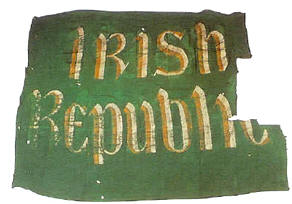“Foggy Dew” was written by Canon Charles O’Neill, a parish priest of Kilcoo and later Newcastle, County Down, in 1919. In 1919 he went to Dublin and attended a sitting of the first Dail Eireann (Irish Parliament). He was moved by the number of members whose names were answered during roll call by "faoi ghlas ag na Gaill" (locked up by the foreigners) and resolved to write a song in commemoration of the Easter Rebellion."
The music is from a manuscript that was in possession of Kathleen Dallat of Ballycastle. That manuscript gives Carl Hardebeck as the arranger. Carl Hardebeck (1869–1945) was a musician, composer and arranger of Irish traditional music. Hardebeck, whose father was German and mother was Welsh, was born in Clerkenwell, London in 1869. He lost his sight when he was a baby. He was educated in London and showed a marked aptitude for music. At the age of twenty-four he moved to Belfast, where he opened a music store, but the venture failed. Despite this, he remained in Ireland for the rest of his life, teaching music, studying the Irish language and collecting folk songs from around the country. He lived and worked in Cork for a while, where he was professor of Irish music, but returned to Belfast and finally settled in Dublin in 1932, where he taught Irish and traditional music in the Dublin Municipal School for two years. He secured prizes at the Feis Ceoil for his compositions and on many occasions acted as adjudicator in singing and musical competitions. Unfortunately, very little attention has been given to Hardebeck, who was one of the instigators in the revival of Irish music; indeed he was largely forgotten about after his death.
The song
chronicles the Easter Uprising
of 1916, and encourages Irishmen
to fight for the cause of
Ireland, rather than for the
British, as so many young men
were doing in World War I.
Suvla was a battleground in the
Middle East. The term "wild
geese" originated with Irish
soldiers who fought with King
James against William of Orange.
Patrick Pearse was a leader of
the Uprising and Eamon de Valera
was another leader who later
became prime minister.
The two men mentioned in the
song are, Padraig Pearse, the
organizer of the rebellion, and
Eamon de Valera, a lesser leader
who survived because he was an
American citizen; he would
eventually become the primary
leader of the hard-line
anti-English faction, helping
lead Ireland to its Civil War
but also guiding its destiny for
many decades thereafter. Some
versions also mention Cathal
Brugha, who was one of the most
extreme nationalists. Since the
song was written in 1919, Canon
O'Neill could hardly know that
Brugha would eventually die in
rebellion against Ireland's
freely elected government -- but
he did.

|


